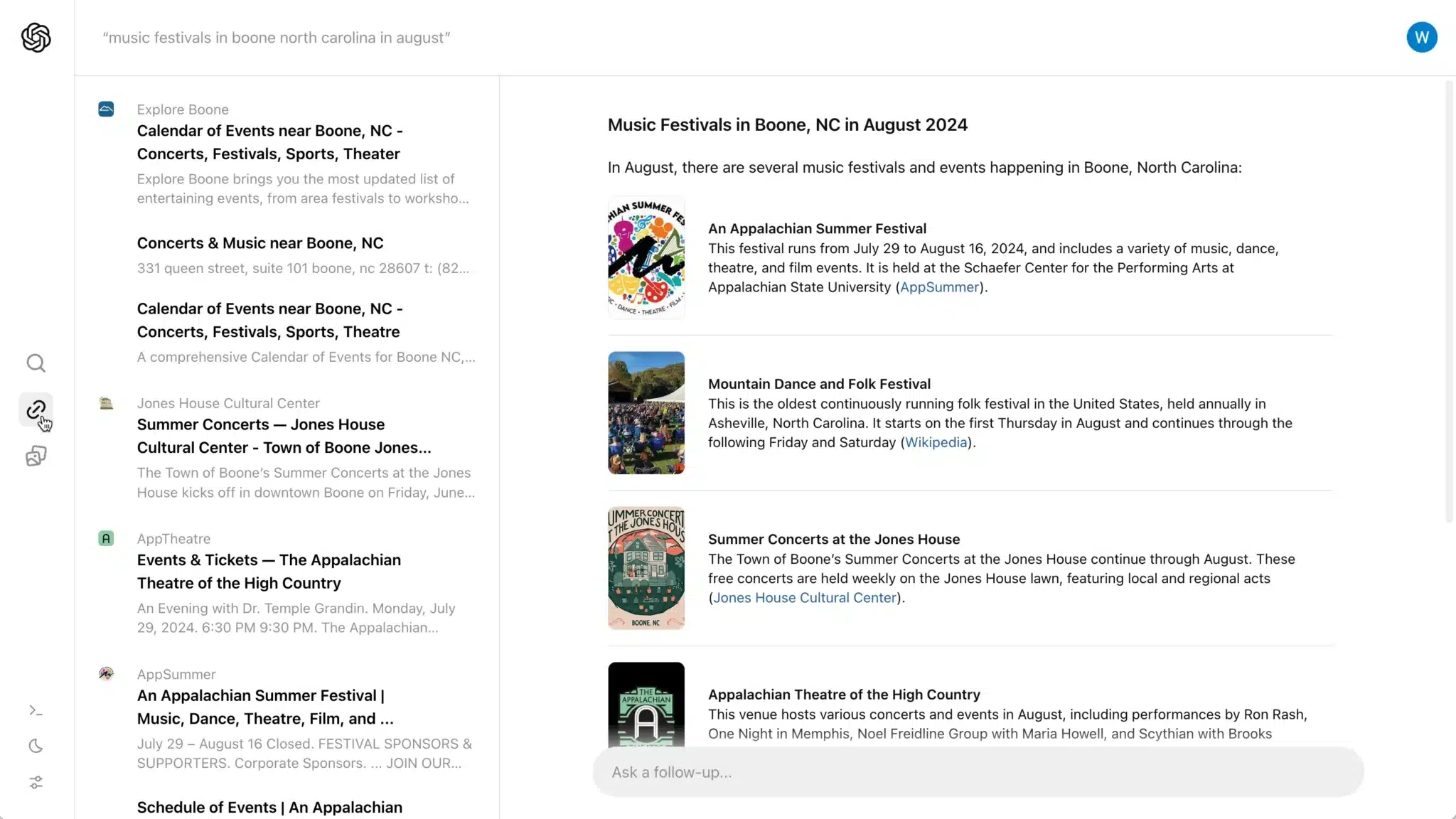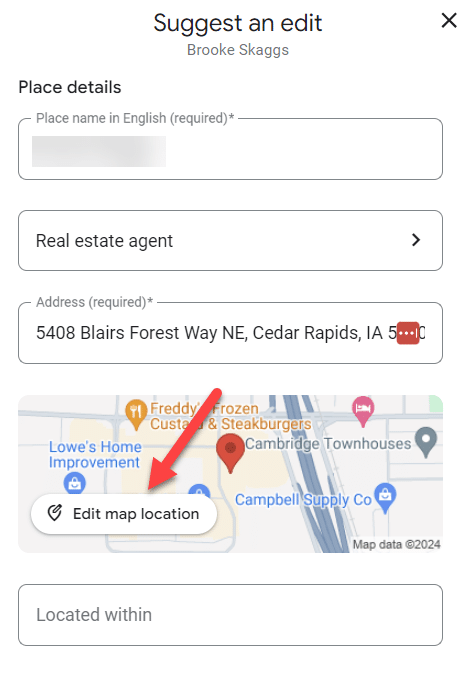Wednesday, July 31, 2024
2 Dead, 1 Injured After Cloudburst Triggers Landslide In Uttarakhand
Delhi Teen Murders Infant Under "Supernatural Influence", Detained: Cops
Tuesday, July 30, 2024
Photos Used For Government Scheme Ads Without Consent, Allege Two Women
3 Killed, 1 Injured After Car Rams Into Truck In UP: Cops
Perplexity launches ad revenue sharing program for publishers
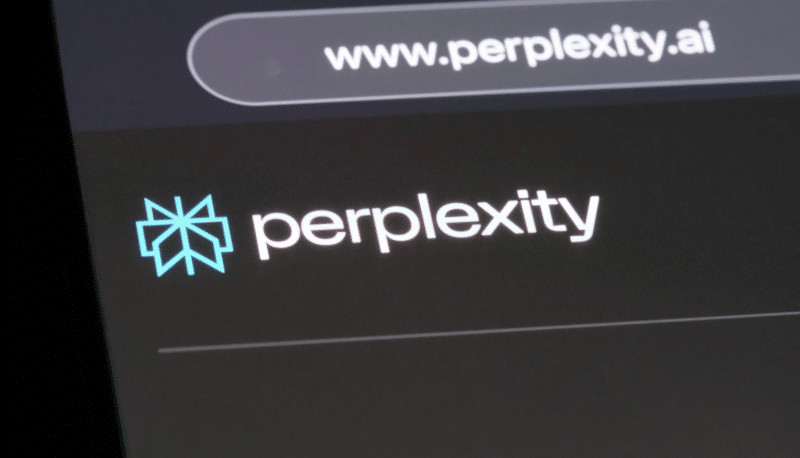
Perplexity, the AI-powered search startup, is rolling out a new “Publishers’ Program” to share ad revenue with media partners, amid recent plagiarism controversies.
This move signals a shift in how AI companies are approaching content partnerships, potentially setting a new standard for compensating publishers whose work is used to train and power AI systems.
Details:
- Publishers will receive a “double-digit percentage” of ad revenue when their content is featured in search results.
- Initial partners include Time, Der Spiegel and Fortune.
- The program includes free access to Perplexity’s Enterprise Pro tier and developer tools.
Why we care. As Perplexity grows, it could become a significant new channel for digital advertising, offering alternatives to dominant players like Google. Their AI-powered search could evolve into new ad formats or targeting capabilities that aren’t possible with traditional search advertising.
The big picture. AI-powered search is more expensive than traditional search, pushing companies like Perplexity to quickly develop sustainable business models.
Between the lines. This initiative comes after recent accusations of plagiarism against Perplexity, including incidents involving Forbes and Wired.
However, unlike content licensing deals from companies like OpenAI and Google, Perplexity claims it doesn’t need to license content as it’s not training its language model on publishers’ writing.
What they’re saying:
- “It’s a much better revenue split than Google, which is zero,” says Automattic CEO Matt Mullenweg.
- Perplexity’s CBO Dmitry Shevelenko acknowledges the program may impact profit margins but sees it as necessary for long-term success.
- Perplexity intends for advertising to be its main source of revenue, Shevelenko said, adding his goal is to break the search engine model, which historically has not provided media partners with a revenue share model
What to watch. How this program compares to similar initiatives from competitors like OpenAI and whether it will satisfy publishers’ concerns about AI using copyrighted content.
from Search Engine Land https://ift.tt/io4DpkH
via https://ift.tt/6uw2HKt https://ift.tt/io4DpkH
Monday, July 29, 2024
The quickstart guide to marketing automation by Edna Chavira


Is your marketing team overwhelmed and underperforming? It’s time to harness the power of automation.
This free guide from Act-On provides a step-by-step blueprint to transform your marketing efforts. Learn how to:
- Streamline your workflow: Reduce manual tasks and focus on high-impact activities.
- Personalize your messaging: Deliver targeted content to the right audience at the right time.
- Generate more leads: Convert website visitors into qualified prospects.
- Improve sales productivity: Align marketing and sales for maximum impact.
Inside this guide, you’ll discover essential steps to build a strong foundation for marketing automation success and tips for launching a successful pilot program. Follow the steps and you’ll be well on your way to achieving marketing automation success. Download The Marketing Automation Quickstart Guide today!
from Search Engine Land https://ift.tt/ewr4a8X
via https://ift.tt/e7kl3KI https://ift.tt/ewr4a8X
85-Year-Old Woman Dies After Allegedly Being Raped In UP: Cops
Pinterest explores publisher partnerships to boost ad sales

Pinterest is testing a new program that could reshape advertising strategy, leveraging the relationships and expertise of news outlets and other publishers.
Why we care. This move creates a new offering for advertisers of potentially more targeted and effective ad placements.
Details:
- Pinterest is exploring an ad auction system on its pages, with revenue sharing for publishers.
- The company aims to tap into publishers’ existing advertiser relationships.
- Publishers could gain access to larger deals and a wider advertiser base.
Zoom out. Other social platforms are making similar moves:
- LinkedIn’s Wire Program. which allows publishers to sell ads on distributed videos, is in beta testing.
Between the lines. These initiatives reflect a broader trend of social media platforms diversifying their revenue streams and enhancing their value propositions to advertisers.
What to watch. The success of these programs could influence future collaborations between social media platforms and traditional publishers.
from Search Engine Land https://ift.tt/XjRfUGF
via https://ift.tt/e7kl3KI https://ift.tt/XjRfUGF
Google Discover promoting AI Overviews for Olympic Games in Paris

Google is now promoting its AI Overviews directly in Google Discover. As users scroll through the Google home page, they may see a sample of a question that Google thinks its AI Overviews in Google Search can do a nice job of answering.
What it looks like. Here is a screenshot of my Google Discover feed showing a promotion for AI Overviews. In this case, Google is promoting Olympics swimming by asking the question, “Why aren’t full-body swimsuits allowed on race day?”
Here is a screenshot:
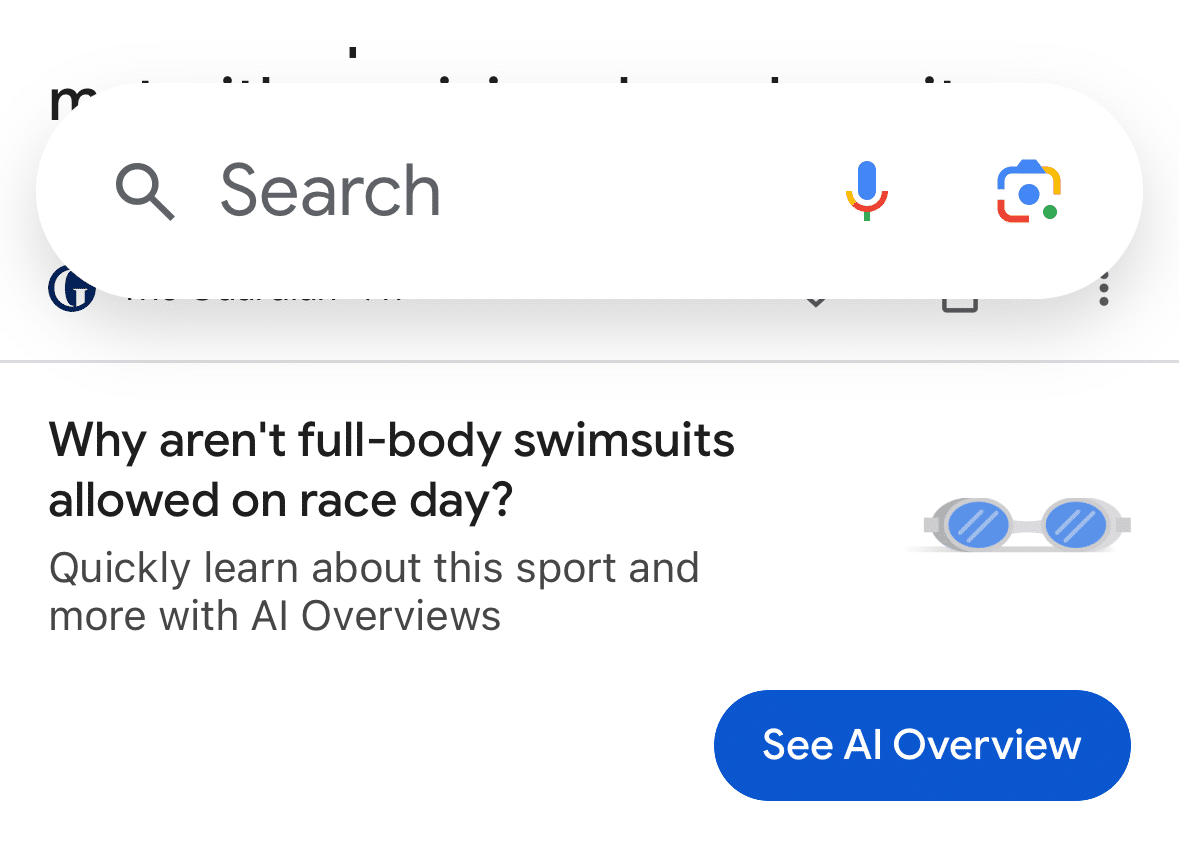
When you click “See AI Overview,” you are taken into Google Search, and Google will then show you the AI Overview at the top of the search results page.
I covered examples of fencing earlier today, here are some of those examples:
Google's AI Overview spotted in Google Discover
— Andy Simpson@lilyraynyc @rustybrick pic.twitter.com/msTeR9j3Le
(@ndyjsimpson) July 27, 2024
Olympics partnership. This is likely part of the Google partnership with the Paris Olympics, where Google announced that you can “learn more about the Games with Gemini.”
Why we care. It is interesting to see Google pushing AI Overviews, maybe to get more users more accustomed to them. It is clear, AI Overviews are here to stay and will be a big part of Google Search for the foreseeable future.
from Search Engine Land https://ift.tt/ztq4wUy
via https://ift.tt/e7kl3KI https://ift.tt/ztq4wUy
Sunday, July 28, 2024
Man Dies Days After Being Hit By Speeding BMW In Mumbai
Video: 3 Men Open Fire, Loot Jewellery Worth 11 Lakh From Maharashtra Shop
Day After 3 Die In Basement, 13 "Illegal" Coaching Centres Sealed In Delhi
"Come Up, Quick": Video Shows Students Rushing Out Of Delhi Coaching Centre
Saturday, July 27, 2024
Delhi Basement Deaths Spark Massive Students' Protest, AAP-BJP Blame Game
Teen Rapes Sister After Watching Porn, Strangles Her Before Their Mother
Friday, July 26, 2024
In Bengaluru Hostel Murder, Police Probe Finds A Relationship Gone Sour
Man Who Killed Women In Bengaluru Hostel Arrested, Roommate Angle Emerges
Delhi Man Stabbed To Death By Neighbour Over Electricity Theft: Police
Asked To Do "Online Tasks", Delhi Man Loses Rs 10.84 To Fraudsters: Cops
Thursday, July 25, 2024
45-Year-Old Man Electrocuted Outside Hut Due To Heavy Rains In Delhi
OpenAI starts testing SearchGPT prototype, here’s what it looks like
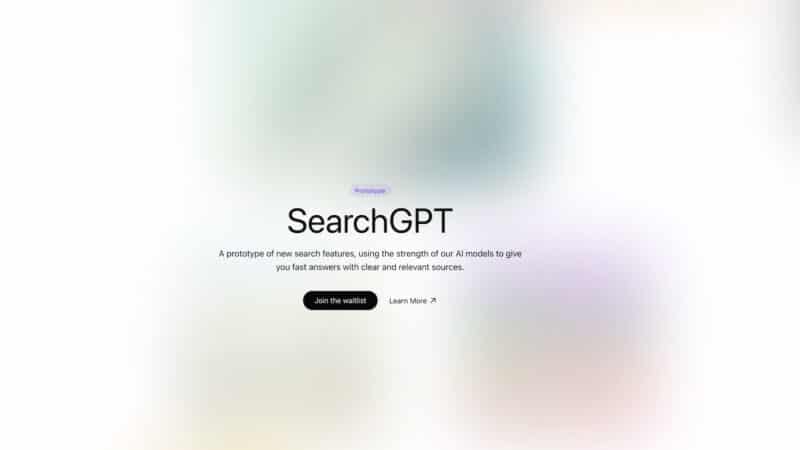
OpenAI today announced SearchGPP, its long-awaited search product.
- SearchGPT is a “temporary prototype” and limited to just 10,000 users at launch.
- OpenAI plans to integrate search features directly within ChatGPT in the future.
How SearchGPT works. SearchGPT responds to queries using information pulled from the web. It will include links to relevant sources, OpenAI wrote in a blog post.
OpenAI is teasing it like this:
- “A prototype of new search features, using the strength of our AI models to give you fast answers with clear and relevant sources.”
What SearchGPT looks like. OpenAI shared some videos of the SearchGPT experience:
- It starts with a search box asking you, “What are you searching for.”
- After entering your query, SearchGPT will provide an answer that includes links to sources within the text answers and shows sources beneath the answer.
- Additional results will be shown in a sidebar.
Here’s a search for [music festivals in Boone, NC in August 2024]:
Here’s a search for [best tomatoes to grow in Minnesota]:
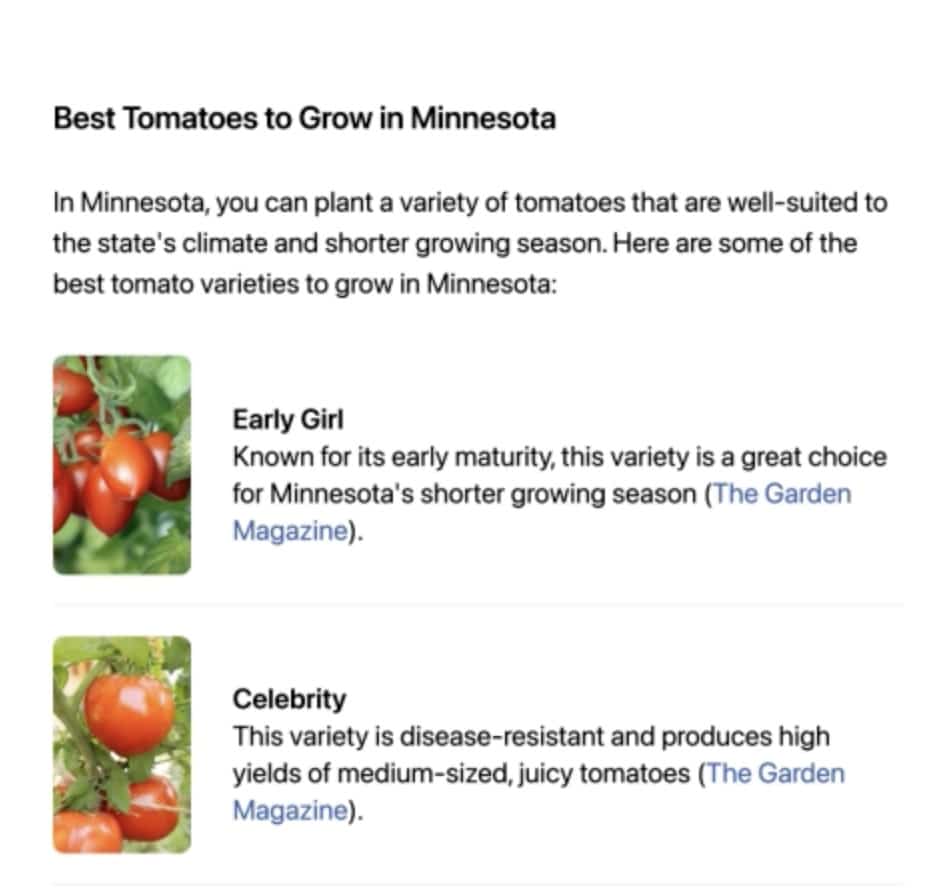
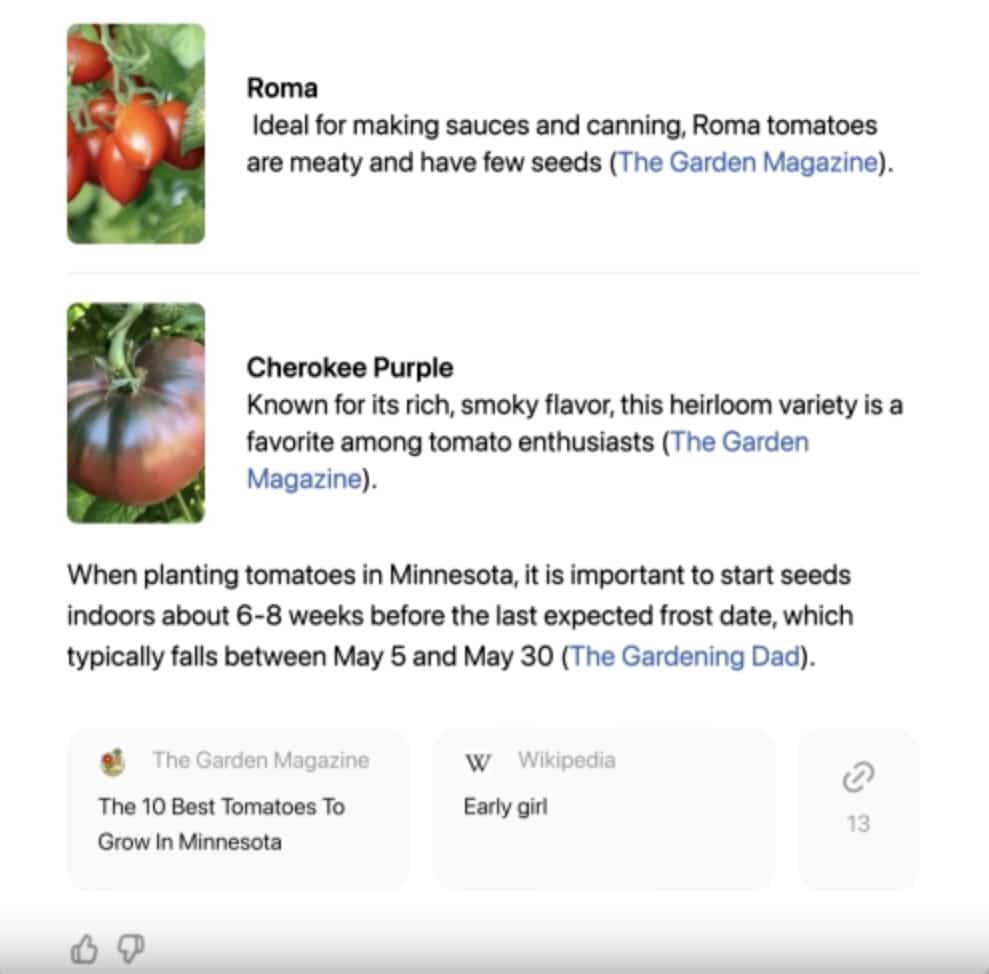
For publishers. OpenAI is “launching a way for publishers to manage how they appear in SearchGPT, so publishers have more choices. Importantly, SearchGPT is about search and is separate from training OpenAI’s generative AI foundation models. Sites can be surfaced in search results even if they opt out of generative AI training.”
Coming soon. OpenAI said it plans to improve searches related to local information and commerce.
Waitlist. You can join the SearchGPT waitlist here.
from Search Engine Land https://ift.tt/7kOUxQS
via https://ift.tt/WlVdORB https://ift.tt/7kOUxQS
Wednesday, July 24, 2024
9 Students Injured After Ceiling Plaster Collapses In Madhya Pradesh School
Google’s AI push reshapes ad landscape as privacy concerns linger

Google’s Q2 earnings call revealed how the tech giant is leveraging AI to enhance its advertising products, potentially opening new opportunities for marketers.
Google is betting big on AI to drive innovation across its ad platforms, from Search to YouTube, while also addressing growing privacy concerns.
Why we care. Google is leveraging AI to transform its advertising products, potentially opening new avenues for marketers despite grappling with privacy issues. Whether advertisers like it or not, AI solutions are here to stay. However, expectations should be tempered because we are still at the beginning of this evolution, with many more developments to come.
Key takeaways:
- AI-powered features: Google introduced over 30 new AI-driven ad features and products in Q2, focusing on streamlining workflows and enhancing creative asset production.
- Retail focus: New AI tools in Merchant Center allow retailers to easily generate campaign-ready assets, with features like virtual try-on driving 60% more high-quality views.
- YouTube growth: Connected TV (CTV) views on YouTube have increased by 130% in the last three years, with the platform now ranking as the second most-watched after Disney in overall TV viewership.
- Search evolution: AI Overviews in Search are showing positive trends, with increased usage and user satisfaction. Google plans to test search and shopping ads within AI Overviews.
By the numbers:
- Advertisers using AI-driven profit optimization and Smart Bidding see a 15% uplift in profit on average.
- Demand Gen, when paired with Search or PMax, delivers an average of 14% more conversions.
- Verizon’s creator ads on YouTube had a 15% lower CPA and a 38% higher conversion rate versus other ads.
Early days. AI in advertising is still in its early days. Google executives emphasized that translating AI capabilities into meaningful solutions for consumers and enterprises will take time.
What they’re saying. “We now believe user choice is the best path forward” for third-party cookies, Google stated, indicating a shift in its privacy approach.
What to watch. How Google’s commitment to privacy-enhancing technologies will evolve alongside its AI-driven ad innovations.
Bottom line. Google’s AI push is reshaping the digital advertising landscape, but must carefully balance innovation with growing privacy concerns.
from Search Engine Land https://ift.tt/lkbD0UV
via https://ift.tt/RP0Ywbk https://ift.tt/lkbD0UV
Tuesday, July 23, 2024
2024 organic website traffic benchmarks by Edna Chavira
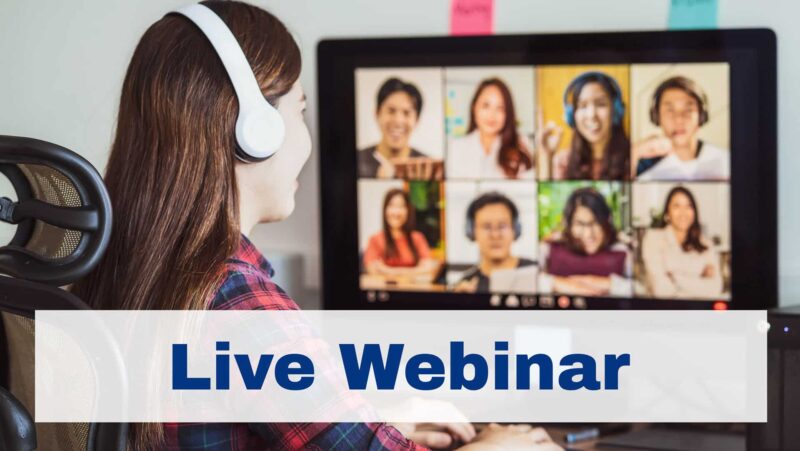

Comparing your website’s organic search performance to the latest industry benchmarks is the best way to contextualize YTD organic search traffic data, adapt SEO and content strategies to maximize results, and set more informed KPIs.
Join Steven van Vessum, Director of Organic Marketing at Conductor, and Shannon Vize, Sr. Content Marketing Manager at Conductor, as they share the latest organic search traffic benchmarks, trends, and insights for 2024 to help inform and improve your search strategy.
Save your spot now to ensure your organic search and content strategies are set up for success for the remainder of 2024 and beyond.
from Search Engine Land https://ift.tt/2OaeGdb
via https://ift.tt/sS7Dvdm https://ift.tt/2OaeGdb
Advertisers react to Google keeping cookies on Chrome
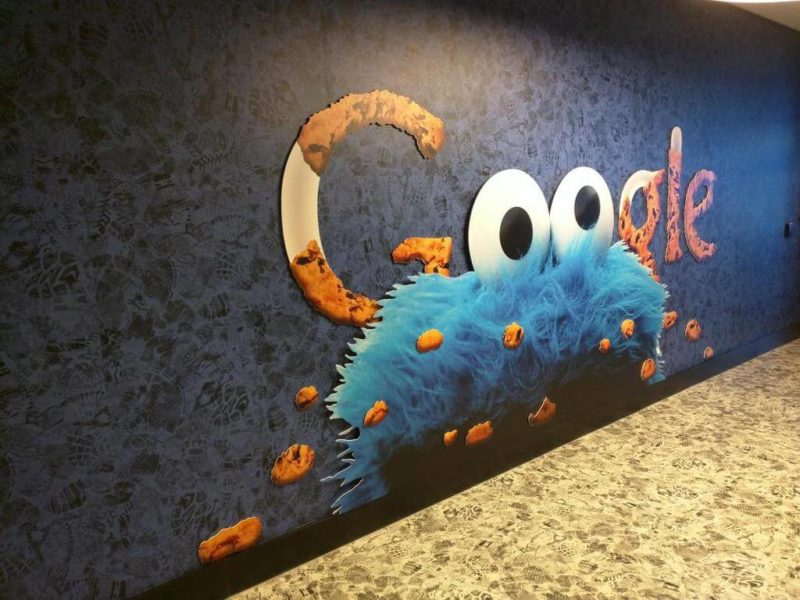
After years of back and forth between Google and regulatory bodies, the news finally came in yesterday that Google is scrapping plans to kill third-party cookies in Chrome.
Unsurprisingly, advertisers had something to say about that.
Emotions ranged from lack of surprise to relief. Many see it as good news for advertisers, while some have mixed feelings.
Most importantly, they implore us to keep emphasizing first-party data and a privacy-first strategy with our clients.
Skepticism and lack of surprise
Niki Grant, a paid media specialist, said she always has been skeptical about a magical 2024 world where third-party cookies have been ruled obsolete, so she was not particularly surprised at the news:
- “Those of us who have had to actively hunt out alternatives are all too aware of the limitations of most cookie-less solutions, and I personally think privacy concerns related to third-party cookies were generally blown out of proportion in the first instance anyway!
- “It looked good for the likes of Google to be super proactive in finding an alternative, but I would have been astounded if they had actually identified a viable alternative in only a matter of years. The proof will be in the Chrome-usership pudding; in the meantime I appreciate Google’s candor instead of a messy ‘make do and mend’ solution to save face.”
Also not shocked by Google’s change in course is Julie Bacchini, president and founder, Neptune Moon:
- “The Google Ads ecosystem (and all ad platforms to be fair) is so dependent on data from cookies it has always been hard to imagine how the platform as we know it could function without cookie data. There are still a lot of questions around exactly what they mean by offering users more control. But it is a bit of a sigh of relief as it is one less thing to have to figure out in the next few months or coming year!”
Gil Gildner, the cofounder at Discosloth, compared this to “The Boy Who Cried Wolf” fable:
- “Google always seems to announce imminent changes, then pushes back the date or scraps plans altogether. It’s how they try to motivate users (who otherwise wouldn’t care) to adopt new tech. They did it with GA4 and they’ll do it with something else next.”
Paid search specialist Sarah Stemen said the delay in phasing out third-party cookies by Google is probably strategic:
- “As the dominant browser owner, Google is under scrutiny for antitrust behaviors. The proposed Privacy Sandbox, while marketed as a privacy-enhancing tool, likely raises barriers for competitors. This could lead to less competition and more market consolidation in the ad tech industry.
- “By delaying the depreciation of cookies, Google buys itself time to either refine the Privacy Sandbox or to make its implications less transparent. Another alternative is that they simply don’t have a solution, but I think it’s likely a delay.”
Relief and positive reactions
Asher Mirza, a digital and performance marketing specialist, said it was great news to wake up with as a performance marketer and shocking as a consumer.
- “Seems like big corp went too far ahead with the new privacy era and realized it would be a loss for everyone and decided for this massive U-Turn. What a time to work in marketing where no one can decide what will happen tomorrow.”
Sophie Fell, director of paid media, Two Trees PPC, said this is good news for advertisers because so many still don’t have a decent grasp on their first party data and this was proving to be a big hurdle for them to overcome.
- “I think the question now is, ‘What’s next?’ It’ll be interesting to see what the uptake on the privacy ‘toggle’ is as a percentage of Android and Chrome users, and then how that impacts audience targeting. For example, will fewer 55+ year olds tweak their privacy settings, and therefore will marketing to this age group using cookies be much easier than marketing to <35s who may be more likely to utilize it? Lots of very interesting data to come over the coming months and no doubt a few more hurdles for advertisers along the way.”
Digital marketer Brett Bodofsky wondered whether similar audiences might come back now.
- “Google Ads deprecated similar audiences due to third-party cookie limitations. Now that the plan is scrapped I wouldn’t hate seeing those come back. I understand there has been launches to help account for their deprecation. But honestly, I liked similar audiences.”
Digital marketing specialist Robert Brady said removing the foreboding deadline (that kept getting pushed back) is a positive.
- “Google has to manage expectations and there is simply too much uncertainty from regulatory bodies and the technology itself to set a firm date on cookie deprecation. I fully expect Google to continue their efforts.”
Mixed feelings/need for adaptation
John Gbemileke Adeoti, growth marketing lead, Expedier, said the news was both annoying and a relief.
- “Relieved that I can put my worries to rest. But annoyed that advertisers and brands don’t need to go through these many changes within a short while. I mean, when you consider how many brands and marketers are still struggling with the switch from UA to GA4! Big tech needs to do better than toy with our time and effort, to be honest.”
Veronika Höller, global search lead, Tresorit, said the privacy debate isn’t going away anytime soon, adding that having an alternative (like the Privacy Sandbox) doesn’t guarantee it will be effective.
- “The real focus should be on empowering users to share their data willingly, for a truly personalized experience. It’s about building trust, brand awareness, and thinking outside the box. We shouldn’t expect data to be handed to us on a silver platter. Most of it is already out there, scattered across different platforms we use. Let’s connect those dots, and suddenly every change isn’t a catastrophe.
- “And even if Google does decide to pull the plug entirely – which, let’s face it, is always a possibility – we’ll be prepared. At the end of the day, we control what users share with us. That happens best when we’re honest, highlight the benefits, combine data sources, and communicate directly with our audience.
- “Instead of waiting for incomplete analytics data and crying over it, let’s be proactive. Let’s build relationships and earn that data. It’s a far more sustainable and rewarding approach.”
Meanwhile, Navah Hopkins, brand evangelist, Optmyzr, said advertisers essentially “won” a game of chicken with Google, but:
- “It doesn’t change the fact that the privacy-first world is here via GDPR, CCPA, and other regulatory considerations. Just because we have an extension on our ability to target through website traffic, see users (device-dependent) across multiple devices and domains, doesn’t change the fact that many markets have adopted privacy-first era rules and regulations.
- “Just because Chrome is giving the extension doesn’t mean other channels are going to follow suit. So while we all can laugh, smile, and cheer that cookies are “here to stay”, people should not be complacent. So here are three critical things every user should do in preparation for the privacy-first world regardless of whether cookies are here or not:
- Build consent into every single thing you do.
- Make sure your stakeholders understand reporting efficacy will be ad channel-dependent and device-dependent.
- Think beyond Google and Chrome.”
Emphasis on first-party data and privacy
Digital marketing strategist Nicholas James said Google’s reversal was expected for several reasons, including the unfinished state of the Privacy Sandbox and with this move, it is still unclear how it will impact its usage.
- “However, refining your first-party data strategies remains crucial, as success in this area will distinguish the true leaders in the evolving digital landscape.”
Fraser Andrews, global search lead, JLR, said he sees this very similarly to the consent mode v2 update.
- “It’s ultimately going to be more beneficial for advertisers to have consented data (provided they actually do something with it!) So my recommendation would still remain – get access to consented data and learn how best to utilize it to enhance performance.”
Heinz Meyer, director and owner, Orris Digital, said the media is taking a slightly extreme stance on this.
- “Google isn’t scrapping the third-party cookie blocking on Chrome, they’re giving users the choice to opt into third-party cookies. Therefore, my advice is: prepare for a world without third-party cookies like we were before.”
Broader industry implications
Marketing strategist Reid Thomas said this is an admission by Google and the IAB in general that there isn’t a solution for tracking other than cookies.
- “Non-cookie identification, due in part to efforts by browsers not owned by the largest DSP, has never really taken off. In essence, Google has worked with privacy regulators and advocates to try and find a solution and simply has not been able to.
- “For advertisers, I’d still keep treating the world as if cookies are deprecated. For ~30% of users, they already are (Safari, especially mobile; Firefox; Opera; and some Edge users). For the rest, recent data shows that cookie-based targeting is ROI negative (Ahmadi et al 2023) and largely is not significantly more accurate than random targeting (Neumann et al 2022).
- “Essentially, this is more of a capitulation that there is no ‘new cookie’ and that rethinking how we reach audiences needs to happen, rather than celebrating that the ‘good old days’ are back.
Lisa Erschbamer, director, digital advertising at Proficio, said she’s unsurprised that Google couldn’t make it work in a way that is profitable to them (and without losing media budgets to other ad networks).
- “But: More people are data and privacy aware and I hope more PPC specialists have started thinking beyond Google Ads, treating it as the part of a whole strategy that it is. So not all bad.”
from Search Engine Land https://ift.tt/rEcGMCn
via https://ift.tt/sS7Dvdm https://ift.tt/rEcGMCn
Monday, July 22, 2024
Scolded By Mother, Teen Runs Away From Home, Found By Railway Cops
Business Dispute Leads To Kidnapping: Mumbai Man Rescued, 3 Arrested
Google scraps plans to kill third-party cookies in Chrome

Google is reversing course and won’t phase out third-party cookies in Chrome as previously planned, instead opting for a new approach that gives users more control, the company announced today.
Why we care. This decision marks a significant shift in Google’s privacy strategy and will come as a relief to many in the advertising industry who have been scrambling to prepare for a cookieless future.
Details:
- Google will introduce a “new experience” in Chrome that will allow users to make informed choices about their web browsing privacy.
- The Privacy Sandbox APIs will continue to be developed and made available as alternatives.
- Google is discussing this pivot with regulators, including the UK’s CMA and ICO.
By the numbers. Recent tests of Privacy Sandbox technologies showed promising results, according to Google:
- 89% recovery of advertiser spend in Google Display Ads.
- 97% recovery of conversions per dollar in Google Display Ads.
- 55% recovery in remarketing spend for Google Ads.
Between the lines. This move suggests Google is trying to balance privacy concerns with the needs of the ad industry and its own business model.
What they’re saying. Anthony Chavez, VP of Privacy Sandbox, wrote in a blog post:
- “We developed the Privacy Sandbox with the goal of finding innovative solutions that meaningfully improve online privacy while preserving an ad-supported internet.”
The big picture. This decision follows more than four years of back-and-forth and multiple delays in Google’s plans to phase out third-party cookies.
What’s next. Google hasn’t provided a specific timeline for the new approach, likely to avoid the pitfalls of previous delays.
from Search Engine Land https://ift.tt/ApE2nXh
via https://ift.tt/lEvYSfO https://ift.tt/ApE2nXh
"Too Many Mistakes": Court On AAP Leader's Petition Against BJP MP
Sunday, July 21, 2024
Fire On Navy Ship During Repair At Mumbai Naval Dockyard, None Hurt
Delhi Woman Falls From Balcony, Dies, Father Alleges Husband's Role: Cops
Heavy Rain Alert In Mumbai, Some Roads Flooded; Chief Minister Takes Stock
Saturday, July 20, 2024
Man Killed After He Objects To Barking Of Pet Dogs In Madya Pradesh
Friday, July 19, 2024
Uttar Pradesh Gets Lucknow-State Capital Region On The Lines Of Delhi-NCR
Wife Among Two Jailed For Life For Man's Murder In Gurugram: Cops
Netflix shifts focus to ad-supported tier as subscriber growth surges

Netflix is phasing out its cheapest ad-free plan in Canada and the UK, with plans to do the same in the U.S. and France.
Driving the news. Netflix added 8 million global subscribers in Q2, with its ad-supported plan gaining significant traction.
The budget-friendly tier now accounts for over 45% of new signups in markets where it’s available, signaling a potential shift in Netflix’s business model.
- The company is also testing pause ads, which appear when viewers stop watching.
Why we care. A higher proportion of subscribers are moving to the ad-supported tier, increasing the available ad inventory and creating more opportunities for advertisers to reach a broader audience.
By the numbers. Netflix reported strong Q2 2024 results, surpassing projections with significant growth in revenue, profits, and subscribers.
- Revenue: $9.56 billion (up 17% YoY)
- Net income: $2.15 billion (up 44% YoY)
- Global subscribers: 277.65 million (up 16.5% YoY)
What they’re saying. “Our ad revenue is growing nicely and is becoming a more meaningful contributor to our business,” Netflix stated in its earnings report.
Between the lines. Netflix is scaling faster than its ability to monetize growing ad inventory, presenting both a challenge and opportunity.
What’s next. Starting next year, Netflix will change how it reports growth, focusing on revenue by region instead of subscriber numbers.
Yes, but. The company warns of slower subscriber growth in Q3 2024 as the impact of paid sharing diminishes.
The big picture. This shift “reflects the evolution of the business” as Netflix prioritizes advertising and subscriber retention.
from Search Engine Land https://ift.tt/BPUqizf
via https://ift.tt/t751cep https://ift.tt/BPUqizf
How to build and manage your brand across multiple platforms

Up to 94% of customers say that a negative review or social media comment has convinced them to avoid a company, according to an InMoment study.
But it’s actually much worse than that today.
Negative reviews only used to impact the person finding them. With AI taking over more and more platforms being used, all content on the web is now fair game to be used as a training source for generative AI responses.
In this article, you will learn:
- Why focusing your online efforts on one channel is no longer enough.
- How to know which platforms to focus on.
- A practical strategy for omnipresence.
‘Double down on one channel’ is really bad advice in 2024
Brands are often overwhelmed by the amount of different platforms they should be working on: Instagram, Facebook, YouTube, TikTok and Pinterest, just to name a few.
The most common pragmatic advice out there used to be to pick one and get really good at it.
As a result, many brands picked Instagram or YouTube, for instance, and doubled down on them. Some of them even managed to create a huge following on their preferred channel and were able to skyrocket their business.
Enter ChatGPT, leading the movement of generative AI.
Large language models (LLM) like OpenAI’s ChatGPT or Google’s Gemini generate answers because they have been trained on masses of content.
The better the training material, the better the answers.
LLMs are keen on getting high-quality training material and are using the web for that.
And guess what?
They are not selecting just one channel!
Everything is fair game to use as training material
Blog posts, X posts, YouTube descriptions or Pinterest posts – everything is suddenly a potential piece of content that might be used as training material for a large language model:
- When you ask Gemini how to fix a flat tire, you might be getting instructions that are based on numerous pieces of content – among them, a description of a YouTube video.
- When ChatGPT is asked about the best bookkeeping software, the answer might be based on a highly upvoted thread on Reddit.
- When a potential client has second thoughts about a coach before buying their program and asks Anthropic’s LLM Claude if a coach is a scammer, the answer might go back to an ex-employee’s review on glassdoor.com
User behavior has changed dramatically, making it impossible for brands to stay focused on just one channel and ignore the rest.
AI does not pick a channel.
You can’t be on all platforms – or can you?
Based on AI picking potentially numerous platforms at once, brands might feel overwhelmed and be tempted to ignore what’s happening right now.
You can’t possibly work your marketing across all channels at the same time, can you?
However, this might not even be necessary.
LLMs need context to generate an answer.
They also need to comprehend entities in order to build their knowledge graph.
By figuring out where the action happens for your audience, the vast majority of brands will be able to narrow it down to approximately five different platforms.
A SaaS business, for example, might find its audience mostly on Facebook, YouTube, X, Reddit and Quora.
At the same time, an art gallery might find its audience mostly on Instagram, Pinterest, YouTube, Reddit and Behance (but they might not have thought Reddit was to be considered).
The first step in order to completely understand where the focus should lie is in-depth audience-platform research.
Dig deeper: How to navigate SEO in a multi-platform world
Research your audience – for real, this time!
When talking to clients about their customers, many will tell me how they defined their client persona: their age, whether they are married, where they go on vacation and their potential political orientation.
Persona definitions are an important part of marketing and greatly help your brand’s messaging, design, ad creatives and more.
However, persona definitions seem to have little practical value for modern search and content marketing, as well as online reputation management.
Unless they are tied to a platform!
Instead of pure audience research, you need to cross-reference their platforms of choice.
Only this way, you will find critical information such as:
- How your audience describes themselves and their goals and desires.
- Where they like to hang out online.
- What kind of content they want to consume on those platforms.
Large language models will use different platforms for different parts of their training.
Once you really get to know your audience and the platforms they are using, it’s time to get your brand “out there” across those platforms as efficiently as possible.
Dig deeper: An SEO guide to audience research and content analysis
The three-tier approach to leveraging the most important platforms
Hardly any brand will have the resources and experience to fully exploit all possibilities on every platform.
To enable cross-platform SEO, here is a practical three-tier approach that specifies three levels of focus and intensity to centralize resources where they will have the most impact on human potential clients and AI.
Tier 1: Full engagement
Based on your audience-platform research, the top five platforms can be seen as Tier 1 platforms. This is where your audience hangs out the most. Here, your consistent brand presence and engagement will have the highest long-term impact.
By actively creating specific content for your brand on Tier 1 platforms, you will position yourself as a thought leader in your industry. This will not only shape the quality of leads you get but also have a positive impact on your conversion rate.
These days, many brands will find Reddit and YouTube within their top 5 platforms.
These two platforms especially make sense as Reddit is partnering with Google and OpenAI and YouTube is part of the Alphabet family.
Research has shown that the priority of Instagram, X, Pinterest or Quora will greatly vary depending on your niche and competitors’ activity levels.
Some industries’ audiences are really keen on getting a lot of orientation, so they ask a lot of questions.
In other industries, people appreciate more inspirational or educational content.
The former might find Quora to be a Tier 1 platform, the latter might see Instagram towards the top.
Strategy: Set your brand up for cross-platform success by creating engaging content on your most important platforms and participating as a branded account in relevant discussions and comment threads.
Tier 2: Product-service branding
While the top 5 platforms should be used to actively shape the conversation, this doesn’t mean that other platforms less frequented by your audience should be ignored. A broader setup, with mentions and engagement across a variety of platforms, will showcase your brand’s relevance and popularity.
For a lot of brands, X might not come across as a Tier 1 platform.
However, in generative AI tests on different tools, X posts seem to often be a very likely source of training material to generate certain answers. This seems to be especially the case when they refer to a personal or business brand’s account.
As a result, a strategy can be to leverage Tier 2 platforms to provide users and AI tools with contextual information related to your brand or products:
- The costs of your product.
- Alternatives for a particular product.
- Times to deliver a particular service.
- Customer service details.
- Common issues that have an easy solution.
- And more.
In addition, specifically for platforms like X, short context-rich messages about the brand, product or ideal client profile (ICP) will semantically link the brand to the most important entities, as well as product applications and pricing levels.
Strategy: Start by leveraging Tier 2 platforms for frequently publishing context-rich content about your brand and products or services and answer specific directed questions on a regular basis.
Tier 3: Related websites
Tier 3 is all about websites that are topically related to your space and ideally have some sort of authority or resource status.
For example, Search Engine Land is a site that’s highly relevant for anybody working in search marketing. However, if you are a professional coach, collaborating with the International Coaching Federation (ICF) will be highly beneficial for your brand’s entity.
Apart from authority websites, you might also consider working with platforms like medium.com, tumblr.com, soundcloud.com or substack.com, employing a minimum effort there but still establishing a context-rich brand presence.
Strategy: Aim to collaborate with at least 3-5 authority websites in your industry by contributing content, participating in discussions, sponsoring events, link building, brand mentions, etc.
Also, try to repurpose content and push it through some of the smaller platforms.
What you write about provides the context
One thing that is easy to miss when working on a platform is that your answer or comment might not only be for the person reading it.
It is also potential training material for an LLM and can only be taken into account if it contains proper context, entities and simple structure.
Imagine someone posting the following message on “X”:
- “Can anybody recommend a good NY burger place?”
- Responses might be:
- a. “Harlem Shake at 100W 124th St.”
- b. “You definitely have to try Petey’s Burger.”
- c. “I love Petey’s Burger in Queens! They always use fresh ingredients, their prices are affordable and their meat comes from organic livestock.”
Although LLMs won’t care about anybody’s favorite food choice, they will surely get more context for training from option C.
Or, as ChatGPT would explain it:
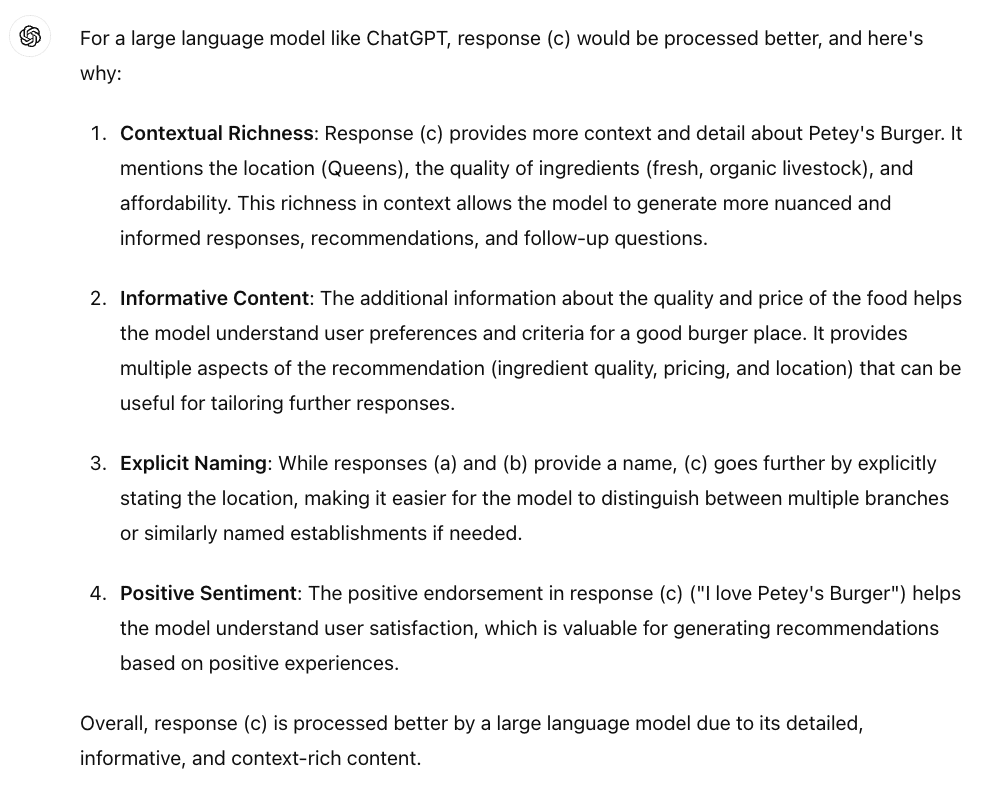
Strategy: Your contributions (whether new content or comments on existing content pieces) must be valuable and rich in relevant context.
Efficient management of multiple platforms
An actionable strategy in order to properly work the top 5 platform can entail things like:
- Assigning different platforms to different members of your team.
- Dedicating specific time slots in team members’ agendas to working on specific platforms.
- Setting up alerts (eg., via Google Alerts) notifying the team about conversations relevant to the brand that might make for an interesting interaction.
- Developing SOPs (standard operating procedures) on how to handle positive and negative brand feedback – and how to achieve a name drop or brand mention.
As so often with SEO and online reputation management, it all comes down to defining and consistently executing a proper process.
Context-rich online reputation across all platforms that matter
The more context you provide on important platforms, the more you will notice actual clients engaging with your brand.
At the same time, you increase the likelihood of AI platforms from Google, OpenAI or others picking up on your contributions and using them as training material about your topics and brand.
Dig deeper: Search everywhere optimization: 7 platforms SEOs need to optimize for beyond Google
from Search Engine Land https://ift.tt/zLlvEJw
via https://ift.tt/t751cep https://ift.tt/zLlvEJw
90% Flights Disrupted In Bengaluru Terminal 1 Due To Microsoft Outage
Thursday, July 18, 2024
On CCTV, Gym Trainer Picks Up Club, Hits Mumbai Man On Head During Workout
Microsoft Advertising introduces Performance Max brand lists

Microsoft Ads is rolling out a new feature called “brand lists” for Performance Max (PMax) campaigns. It promises more control over your brand image and ad visibility.
Brand lists allow advertisers to exclude their ads from appearing alongside specific brands, potentially improving ad relevance and return on ad spend (ROAS).
How it works.
- Advertisers can create up to 20 brand lists.
- They can add brands from a predefined list or request specific brands to be added.
- Brand exclusion can be applied to prevent ads from serving on branded search queries.
Why we care. This PMax feature offers advertisers more control over the sites and searches they see their ads against. It allows advertisers to avoid association with competitors or brands that don’t align with their values.
Key features.
- Covers misspellings automatically.
- Includes an editorial review process for brand requests.
- Takes 4-6 weeks for brand requests to be reviewed.
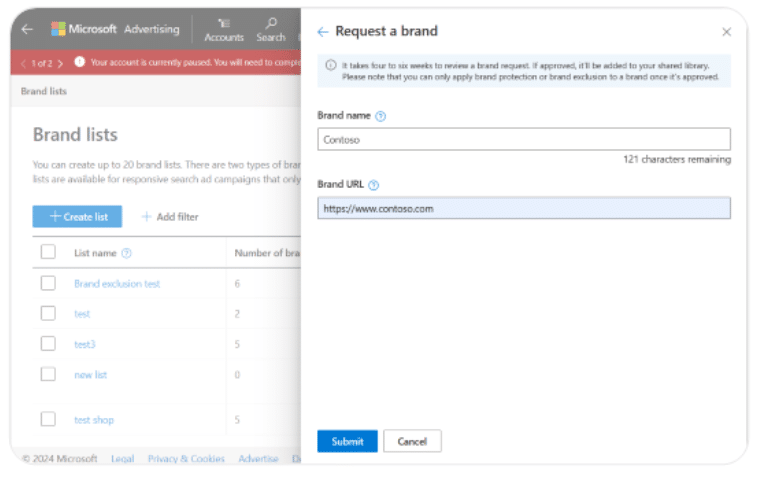
Between the lines. This move signals Microsoft’s efforts to compete with Google Ads by offering more granular control over ad placements.
What they’re saying. Microsoft touts the benefits as helping advertisers “mitigate risks” and “display ads with relevant content.”
The big picture. As digital advertising becomes more complex and automated, platforms are introducing more tools for brand safety and ad targeting precision.
from Search Engine Land https://ift.tt/3f8yb6H
via https://ift.tt/PJmuzfv https://ift.tt/3f8yb6H
How AI is shaping the future of ecommerce advertising by Adobe x Meta


No matter what products or services your ecommerce business focuses on, elevating the customer experience is the key to unlocking better sales and conversions. In fact, businesses that have placed a strong emphasis on customer experience are not just meeting expectations; they’re exceeding them.
The State of Digital Customer Experience Report found that over the past three years, companies that prioritized customer experience have witnessed improved growth metrics, including:
- New customer growth: A 23% surge in new customer acquisition, indicating an expansion of the customer base.
- Lead generation: An 18% climb in lead generation, reflecting enhanced marketing effectiveness and customer interest.
- Referral rates: A 17% increase in referral rates, showcasing the power of word-of-mouth and customer satisfaction.
- Customer loyalty: 12% more repeat business, demonstrating a strong customer retention strategy.
- Profitability: A 9% rise in profit per customer or account, translating to a healthier bottom line.
By leveraging AI-powered solutions, you can take the customer experience to new heights. These technologies offer a seamless integration of personalization within advertising campaigns. By analyzing and utilizing customer shopping behaviors and trends, AI not only enhances ad performance but also drives sales and conversions. Personalizing ads at scale enables you to better connect with your customers and drive action that increases gross merchandising value (GMV) and return on ad spend (ROAS).
Analyze customer behavior and identify trends
Knowing your customers and understanding their shopping behaviors allows you to create ads that resonate with them, which can help overcome challenges like shopping cart abandonment. AI-powered solutions help you evaluate ad performance and viewer demographics, and with features like built-in analytics, your ads are precisely targeted, allowing you to make meaningful connections with your customers. In fact, 46% of customers remember positive experiences that felt highly personalized, and 34% appreciate relevant ad content that meets their needs and interests.
Using first-party data—information collected directly from your customers through their interactions with your website or app—is crucial for advertising. It enhances privacy compliance and reduces your dependence on third-party cookies, especially since cookies are on track to be phased out by web browsers.
Adobe Commerce provides AI-powered tools that streamline the process of understanding and responding to customer needs. By analyzing data with AI, this platform can personalize shopping experiences by adjusting search results, content and recommendations to match each customer’s preferences. This approach not only improves your customers’ experience but also increases the likelihood of sales by providing them with exactly what they need when they need it.
Drive better outcomes with personalized ads
Personalization drives better ad performance, leading to improved customer outcomes. Companies that grow faster realize 40% more of their revenue from personalization than their slower-growing counterparts.
AI-powered tools like Meta Advantage+ shopping campaigns can help you enable automation across each step of the ad creation process. These automation tools can improve performance by making media more efficient. You can also enhance your entire campaign flow end-to-end. Additionally, you can use automation to enhance select parts of a campaign, such as audience, creative, destination, placement or budget for more niche strategies.
Automated catalog advertising solutions enable you to showcase your entire product range within a single campaign, personalizing ad creative by matching specific products with individual customers. For example, imagine a customer shows interest in a scarf but doesn’t make a purchase. Later, the system automatically crafts and serves a personalized ad featuring similar scarves or complementary accessories, with AI tools selecting the items most likely to convert the shopper, paired with the highest performing creative elements. This type of automation ensures your campaigns are “always on,” continually optimizing and promoting your entire inventory without requiring manual adjustments for each ad.
AI can also help find and direct customers to the most likely conversion point, whether that’s on your website or a dedicated online store. This helps you meet shoppers where they are, providing them with more ways to shop and, in turn, enhancing their overall experience. These solutions improve return on investment by providing a comprehensive view of your customer’s journey.
Reach the right audience with the right ad
With AI tools in your marketing mix, you can enhance your ecommerce advertising by leveraging first-party data to deliver personalized experiences, boosting customer engagement, and improving conversions. The AI-powered solutions from Adobe Commerce and Meta are quick and easy to implement, providing you with the tools you need to take your ecommerce advertising to the next level. To learn more about how Adobe and Meta can help you reach the right audience with the right ad, download our eBook.
from Search Engine Land https://ift.tt/Meb3WJG
via https://ift.tt/l2MydQD https://ift.tt/Meb3WJG
Wednesday, July 17, 2024
'Friend' Arrested For Making Viral Mumbai Couple's Intimate Videos: Cops
13 Kg Gold, Electronic Items Worth Rs 10.33 Crore Seized At Mumbai Airport
Google Merchant Center Next rollout expands
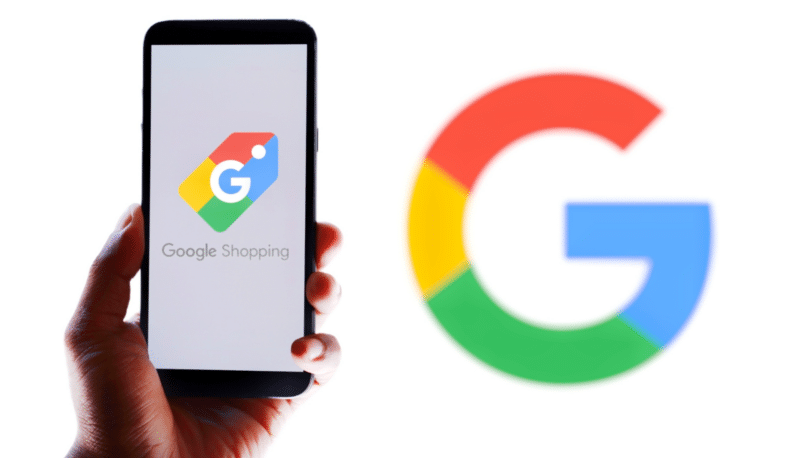
Google is now expanding the rollout of Merchant Center Next to all merchant accounts, following its announcement at Google Marketing Live 2023.
Merchant Center Next (GMC Next) brings a revamped interface and new features to Google’s ecommerce platform, potentially streamlining operations for online retailers.
Key points:
- New users and many existing ones already have access.
- Features a refreshed user interface.
- Reinvents complex features and introduces new experiences.
- Classic Merchant Center users are being notified when the update is available.
Why we care. Advertisers should familiarize themselves with the new interface and features to maintain efficiency, as the old interface likely will be deprecated soon.
Yes but. Advertisers who have already tested GMC Next out have faced issues with using the new interface.
What’s next. All remaining merchants can expect to transition to the new platform in the coming weeks.
from Search Engine Land https://ift.tt/5VsK1ug
via https://ift.tt/l2MydQD https://ift.tt/5VsK1ug
Tuesday, July 16, 2024
Delhi Doctors Report Rise In Hand, Foot, Mouth Disease In Children
600 Jobs, 25,000 Seekers: Air India Drive Sets Off Stampede Fear In Mumbai
Apple revamps App Store search layout, emphasizing ads and suggestions
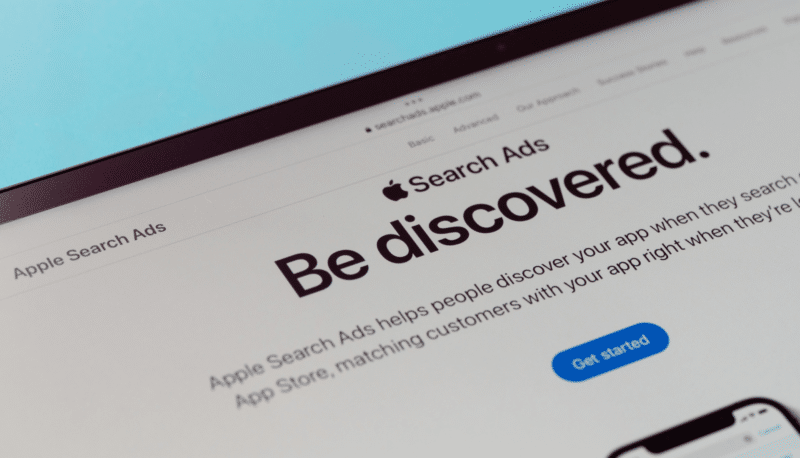
Apple updated the App Store’s Search tab, removing the Discover section and placing suggested apps, including ads, more prominently below the search bar.
Why it matters. Advertisers will now have their apps showing at the top of the Search tab potentially increasing their ad exposure as well as leading to higher click-through rates for app install ads.
Details:
- Discover section removed from top of Search tab
- Suggested apps (including an ad) now prominently placed below search bar
- Expandable suggestions feature added
- Direct category browsing available from Search tab
- Top charts moved to Browse section
First seen. We were alerted to this update from Talha Mumtaz’s LinkedIn:
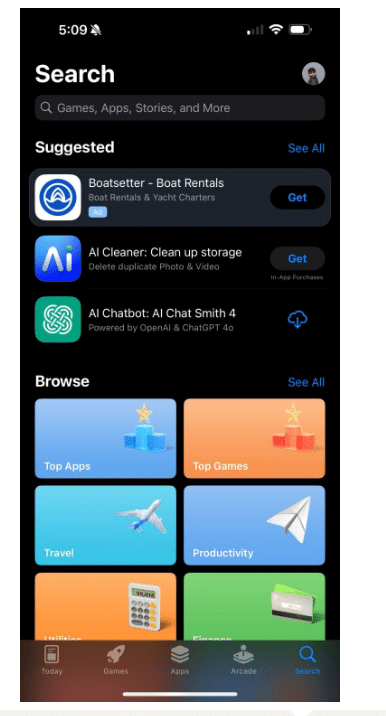
Between the lines. The repositioning of suggested apps and ads to prime “above the fold” real estate could boost visibility and potentially increase click-through rates.
What to watch. How this layout change affects app discovery patterns and ad performance metrics for developers and advertisers.
Bottom line. While streamlining the search experience, Apple’s update also creates more prominent placement for paid app promotions, potentially altering the app discovery landscape.
from Search Engine Land https://ift.tt/FVYbXTr
via https://ift.tt/mbTrKXL https://ift.tt/FVYbXTr
Meta expands overlay ads to Instagram Reels

Meta added overlay ads to Instagram Reels, offering new ad placements to reach users with banner ads while they watch reels.
The big picture. This move aligns with Meta’s ongoing strategy to monetize Reels across its platforms, following the earlier introduction of overlay ads on Facebook Reels.
Details:
- Overlay ads are now available on Instagram Reels.
- Two formats: single-image and image carousel ads.
- Appear as banner ads at the bottom of the screen during Reels playback.
Why we care. Instagram Reels is a rapidly growing content type with high user engagement. This update allows advertisers to tap into this audience more effectively, and the option for single-image or carousel ads provides flexibility in crafting messages and showcasing products
How to access:
Advertisers can select these placements in Meta Ads Manager through:
- Advantage+ placements
- Manual placements → overlay and post-loop ads on Reels
- Manual placements → Stories and Reels
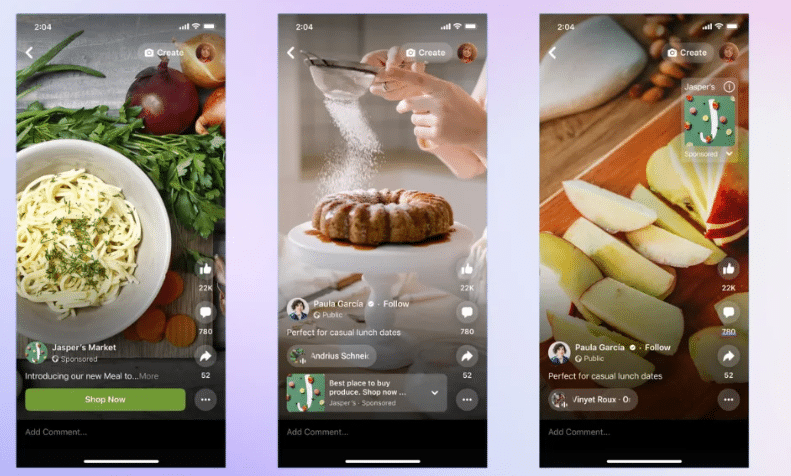
Between the lines. Meta is gradually rolling out these features, meaning they may not be immediately available to all advertisers.
Bottom line. This expansion offers advertisers new ways to engage with users consuming short-form video content on Instagram, a key growth area for Meta.
from Search Engine Land https://ift.tt/gwsUYKC
via https://ift.tt/mbTrKXL https://ift.tt/gwsUYKC
Monday, July 15, 2024
Heavy Rain Likely In Mumbai Tomorrow; Weather Office Issues Orange Alert
The Google Maps pin scam: A new Google Business Profile threat

There’s a scam going on in the world of Google Maps/Google Business Profile.
Competitors can move Google Map pins to a new location which can negatively impact rankings.
This has been happening for several months and impacted many Google Business Profile listings.
It’s easy for scammers to make this change using the Suggest an edit feature on a Google Business Profile and then editing the map location.
When the Map pin is moved to the new location, Google thinks the business is no longer in the location it was in before, so rankings can tank.
Why is this a problem for you?
Google doesn’t notify the owners and managers of the GBP listing that the Map pin was moved.
So unless you’re specifically looking for this change, you may not realize why you’re no longer getting calls or customers. And if you’re keeping track of how your Google Business Profile ranks, you may not understand why your rankings have suddenly dropped.
If you’ve been hit by this scam, you cannot simply go into your Google Business Profile and reposition your pin to the correct location because many who do this get hit with a Google Business Profile suspension.
How to fix the issue
Right now, the best way to fix this issue is to log into Google using an email address that is not connected to any Google Business Profile.
Then, search for the business listing on Google Maps and follow these steps:
- Click the Suggest an edit button on the Google Business Profile.
- Click Change Name or other details.
- Click Edit map location.
- Drag the map until the pin is in the correct location.
- Click Save.
Remember, it’s always important to check your Google Business Profile for any changes that others make to your GBP listing.
from Search Engine Land https://ift.tt/Py2Lpmu
via https://ift.tt/OKHnxQC https://ift.tt/Py2Lpmu
Delhi Pollution Under Control Centres Shut Amid Protest Over Fee Hike
Sunday, July 14, 2024
AAP vs Tihar Jail On Arvind Kejriwal's Weight Loss, Drop In Blood Sugar
Mumbai Hoarding Collapse: Chargesheet Flags Ignored Soft Soil Warning
What Delhi Minister Said On Row Over School's "Unapproved" Revised Fee
Saturday, July 13, 2024
UP Man Kills Brother To Claim Insurance Money, Had Affair With His Wife
UP Man On The Way To His Wedding, Gets Bitten By Snake, Dies
Woman Permitted To Terminate 32-Week Pregnancy Due To Health Risk
Navi Mumbai Airport To Be Operational In March 2025, Says Union Minister
Friday, July 12, 2024
Man Involved In Burger King Murder Among 3 Gangsters Killed In Encounter
The latest jobs in search marketing

Looking to take the next step in your search marketing career?
Below, you’ll find the newest jobs at brands and agencies in SEO, PPC and digital marketing – as well as positions we’ve shared in previous weeks that are still open.
Newest jobs in SEO, PPC and digital marketing
SEO Analyst, Greenlight (Remote)
- Salary: $80,000 – $100,000
- Perform comprehensive keyword research and identify high-value keywords relevant to our industry and target audience to guide content and optimization strategies
- Partner with SEO Manager and Content Manager to create a always-on content calendar to teach kids and parents about the world of money & beyond
SEO Manager, Upgrow (Remote)
- Salary: $70,000 – $80,000
- As an SEO Manager, you will be the main point of contact for 4-6 client accounts, handling account management, strategy, and project management.
- After studying each client and their industry, you’ll develop a strategy to achieve their performance goals, not just traffic but, more importantly, conversions.
SEO Content Manager, Black & White Zebra (Remote)
- Salary: $90,000 – $100,000
- Meticulously plan and prioritize the cluster development for specific publications
- Develop, execute and map keyword plans for those clusters that map to our internal customer journeys
Senior Content and SEO Manager: Car Insurance, MoneyGeek.com (Remote)
- Salary – $70,000 – $100,000
- Auto Insurance vertical roadmap ownership to support long-term revenue growth.
- Creating a content strategy doc that is informed by competitive and user research and adhering to SEO best practices so that our content will delight our users.
Search Engine Optimization Manager, Covert Recruiting (Remote)
- Salary: $110,000 – $130,000
- Drive the SEO program including the strategy, implementation, reporting, consulting and daily communications.
- Develop and execute comprehensive SEO strategies that drive consistent revenue growth through organic search.
Paid Media Manager, Qualcomm, (San Diego, CA)
- Salary: $125,000 – $187,000
- Strategy Development: Align with various business stakeholders to understand the business need and craft a well thought-out media brief for media agency.
- Campaign Management: Oversee the entire campaign lifecycle from concept to execution, including media brief development, user journey mapping and budget management.
Paid Search Manager, Sphere Digital Recruitment (Remote)
- Salary: $75,000 – $85,000
- Build, execute and optimize paid media campaigns.
- Manage campaign briefs and craft strategy based on clients goals.
Sr. Manager, Performance Marketing, CLEAR (Hybrid, New York, NY)
- Salary: $120,000 – $150,000
- Develop and implement comprehensive performance marketing strategies to achieve CLEAR’s business objectives.
- Manage and optimize performance marketing campaigns across platforms such as Google Ads, Facebook Ads, LinkedIn, and others.
Search Engine Marketing Manager (SEM), Yelp (Remote)
- Salary: $89,000 – $150,000
- Manage the day-to-day operations for our paid search marketing strategy, setting up campaigns, optimizing bids, ad copy, landing pages and more.
- Analyze performance metrics from internal database tools, third party systems, APIs, and data feeds to drive growth in profit.
Paid Search Manager, Wilshire Law Firm (Los Angeles, CA)
- Salary: $120,000 – $200,000
- Plan, develop, and implement comprehensive paid search strategies to drive direct responses from target consumers in the legal space.
- Manage PPC campaigns that increase the amount of potential clients calling into our firm.
More SEO jobs
Digital Content Strategist – Ads Expert, Cornershop Creative (Remote)
- Salary: $65,000
- Google Ads management, specifically the nuances that come with managing Nonprofit Ad Grant accounts to optimize their spend within the limitations of the grant
- Create and implement SEO strategies, including performing keyword research (using Moz and other tools) to optimize web content for SEO
Sr SEO Specialist, Winston Digital Marketing, (Remote)
- Salary: $65,000
- Independently execute strategies, deliverables, and communication for client accounts.
- Collect and analyze website data to create campaign insights based on client goals, resources, and SEO best practices.
SEO Manager, Zocdoc, (New York, NY)
- Salary: $100,000
- Leading a continuous process to identify product, content, UX, and technical SEO projects to grow Zocdoc’s organic search audience
- Developing and proposing data-driven recommendations for SEO tests and changes, complete with thorough analysis and rationale
Search Engine Optimization Manager, Previsible.io, (Remote)
- Salary: $85,000
- Identify site opportunities and potential limitations impacting organic search performance
- Prioritize SEO initiatives and work hands-on with companies to implement
SEO Growth & Development Manager, RYNO Strategic Solutions (Remote)
- Salary: $80,000
- Lead, mentor, and cultivate a team of SEO professionals, instilling a culture of continuous learning and professional growth
- Innovate and pioneer new SEO strategies, serving as the driving force behind our team’s advancement and success in the ever-evolving digital landscape
SEO & Social Content Manager, Bloomfield Growth Agency (Remote)
- Salary: $65,000
- Technical SEO: Must hold relevant certifications from Google and have a strong grasp of technical SEO to draft clear requirements for technical changes that developers can implement.
- Keyword Strategy: Ability to conduct in-depth keyword research, analyze current keyword performance, identify high-impact keywords, understand competitive keyword landscape, and provide actionable insights on client ranking within the industry.
Senior SEO Specialist, Winston Digital Marketing (Remote)
- Salary: $60,000
- Independently execute strategies, deliverables, and communication for client accounts.
- Develop client strategies and roadmaps with occasional managerial input.
SEO Account Manager, Clearscope (Remote)
- Salary: $60,000
- Quality content is the cornerstone of a winning SEO strategy. You will walk prospects and customers through how to make the most out of the Clearscope platform to create and maintain content that meets searcher needs.
- We believe all Clearscope customers should have a point-of-contact when Clearscope or SEO-related issues arise. You will build customer trust with your in-depth knowledge of search trends and our platform.
SEO Specialist, Veracity Insurance (Remote)
- Salary: $75,000
- Since you’re a search engine marketer, your project management muscles are awesome, so flex them. Your flair for data analysis and using numbers as a success guide are also key.
- Speaking of numbers, tracking KPIs and analyzing outcomes to say what worked and what didn’t will definitely come in handy. We’ll fail on the way to success, so learning and adapting are great traits.
Content Marketing Manager, Red Stag Fulfillment (Remote)
- Salary: $80,000
- Oversee the execution of all content across various formats and channels, starting with SEO blog posts and expanding into thought leadership articles, podcasts, videos, social media, sales tools, and anything else that comes up.
- Working with our Head of SEO to scale our SEO content engine using freelance writers, writing services, AI, and a team of monkeys with typewriters and SEO microchips implanted in their brains (just making sure you’re paying attention).
SEO Account Manager, Clearscope (Remote)
- Salary: $80,000
- Quality content is the cornerstone of a winning SEO strategy. You will walk prospects and customers through how to make the most out of the Clearscope platform to create and maintain content that meets searcher needs.
- We believe all Clearscope customers should have a point-of-contact when Clearscope or SEO-related issues arise. You will build customer trust with your in-depth knowledge of search trends and our platform.
Head of SEO & Content , Blockovate (Remote)
- Salary: $80,000 – $100,000
- Strategizing, executing & reporting on an SEO & content strategy
- Helping set and hitting ranking & revenue based targets
SEO Lead, AZDS Interactive Group (Remote)
- Salary: $70,000 – $125,000
- Serve as the primary strategic account lead for all SEO-related Client strategic planning and performance reporting meetings
- Create SEO specific strategic plans, identify KPIs, and both assist in and direct other team members to execute tactical plans to accomplish objectives
Senior SEO Manager, GoPro (Remote)
- Salary: $114,800 – $152,500
- Develop and implement forward-looking SEO strategies that drive organic traffic lift and take advantage of rising search trends
- Monitor and drive SEO technical optimizations, partnering with web engineering and merchandising
Content Lead, 3Search (Remote)
- Salary: $110,000 – $150,00
- Propose and drive the content strategy to help increase brand awareness, product awareness, and community growth
- Create engaging content across various channels to drive audience engagement and thought leadership, including website, blog, product videos, and Twitter content support
SEO Manager, Zocdoc (New York, NY)
- Salary: $100,000 – $145,000
- Leading a continuous process to identify product, content, UX, and technical SEO projects to grow Zocdoc’s organic search audience
- Conducting audits and research to pinpoint growth opportunities
SEO Account Manager, Greenlane (Hybrid, Eagleville, PA)
- Salary: $75,000 – $95,000
- Identifying technical SEO issues and their fixes
- Content strategy and topic ideation aimed at improving organic traffic
Principal SEO, Upwork (Remote)
- Salary: $136,000 – $184,000
- Influence the SEO strategy for the business at large and generate buy-in from executive leadership.
- Strategically grow and defend channel performance and trajectory
- SEO Support for Stakeholders: Providing SEO guidance for content creators, web developers, and marketing teams across the org.
Senior SEO Manager, Minute Media (Remote)
- Salary: $80,000 – $120,000
- Conduct technical site analysis and collaborate with the VP of Growth and our engineering team to prioritize and implement changes leading to search visibility improvements.
- Creation of weekly and season long sports related content strategies, communicated to multiple international editorial teams.
Performance Marketing Manager for Media & Entertainment, Evercast (Remote)
- Salary: $115,000 – $140,000
- Plan and execute all digital marketing, including SEO/SEM, marketing database, email, and social media. Strategize, plan, launch, and optimize advertising campaigns according to targeted buyer personas and buyer journeys, and align across search, social, display, etc.
- Closely monitor campaign performance and critical metrics to uncover trends, problems, and opportunities.
Senior SEO Analyst, Siege Media (Remote)
- Salary: $72,000 – $80,000
- Suggest and implement SEO best practices for client sites across a variety of industries and sizes including eCommerce, tech, and finance
- Stay up to date on SEO industry changes and communicate technical improvements to non-technical stakeholders
Sr Analyst, SEO, Home Depot (Remote)
- Salary: $65,000 -$100,000
- Perform continuous site auditing, and recommend scalable on-page optimization based on business objectives for both existing functionality and new opportunities
- Provide SEO best practices in alignment with current technical principals and homedepot.com systems
Executive Digital Director, Inc Magazine, Hybrid (New York, NY)
- Salary: $155,000 – $222,000
- Assign the writing and editing of stories for the site with headlines that are compelling, brand-appropriate and SEO-friendly.
- Collaborate with sales and marketing teams to develop digital-only or digital-first editorial programs for sponsorship.
Tech Lead (Webflow/SEO), Masse (Remote)
- Salary: $48,000 – $60,000
- Build landing pages for our clients that convert with SEO and Ads
- Identify and Implement Technical SEO/Performance improvements across our clients’ websites
SEO Strategist, Tripadvisor (Remote)
- Salary: $110,000 – $140,000
- You’ll partner with cross-functional teams as product/project manager to define product specifications, establish milestones, and assure quality.
- You’ll be writing specs, running tests, analyzing results, and making decisions that have real effects on revenue and profit for the company.
Growth Marketing Manager, B2B SEO Strategy, Meta (New York, NY)
- Salary: $150,000 – $211,000
- Lead and implement SEO Strategy to increase search visibility/rankings, grow traffic with relevant intent and drive incremental revenue
- Perform keyword research and prioritization, balancing opportunity for growth with level of effort to optimize for potential impact
Senior SEO Manager, GoPro (Remote)
- Salary: $114,800 – $152,500
- Develop and implement forward-looking SEO strategies that drive organic traffic lift and take advantage of rising search trends
- Monitor and drive SEO technical optimizations, partnering with web engineering and merchandising
Head of SEO, Meriwether (Remote)
- Salary: $75,000 (annual)
- Learn the Meriwether way of SEO through 1:1 coaching with our founder, Josh. Become lead strategist and main POC for 4-8 clients.
- Learn the ins and outs of our content ops and “Lean” — our agency operating system.
Search Engine Optimization Manager, Jordan Digital Marketing (Remote)
- Salary: $705000 to $95,000 (annual)
- Work across several accounts to drive the maximum results from Organic Search, using advanced SEO and content strategies both on and off page.
- Diagnose and prioritize organic opportunities for growth through data platforms, technical and UX audits, content performance and more.
SEO Consultant, Botify (Remote)
- Salary: $130,000 (annual)
- Engage in discovery sessions to learn about customers’ businesses, their strategic initiatives, goals, and progress towards achieving the goals
- Carry out detailed site audits and propose and present SEO strategies and roadmaps
Principal SEO, GoodRX (Remote)
- Salary: $135,000 to $288,000 (annual)
- Influence the SEO strategy for the business at large and generate buy-in from executive leadership.
- Highlight trends and competitor movement within the rapidly evolving health vertical.
Associate Director, SEO, Brainlabs (New York, NY)
- Salary: $100,000 to $120,000 (annual)
- Owns, manages, and grows client relationships through exceptional communication, account management, and SEO expertise
- Accountable for all action items, as agreed upon with the client
SEO Specialist, Pure Visibility (Remote)
- Salary: $58,000 to $65,000 (annual)
- Work with the SEO director to perform in-depth visibility audits for new clients and compile the results along with prioritized recommendations.
- Work with the SEO director to analyze and create action plans around common technical SEO components (canonicalization, sitemaps, crawl budget, schema, hreflang).
SEO Strategist, Online Optimism (Remote)
- Salary: $51,000 (annual)
- Oversee the search and content management of 6 – 10 of Online Optimism’s search & content accounts.
- Perform keyword research for clients, to determine valuable pieces of content to rank for.
More PPC jobs
Paid Search Marketing Manager, Vanta, (Remote)
- Salary: $105,000
- Analyze global paid search campaigns and drive daily optimizations as needed across bids and keywords.
- Drive short, medium, and long-term workstreams to optimize ad copies, sitelinks, and landing page content for evergreen campaigns and product or campaign expansions.
Performance Marketing Manager, Clear Point Consultants, (Remote)
- Salary: $80,000
- Spearhead paid social media acquisition across platforms such as Facebook, Instagram, TikTok, Reddit, and more.
- Direct DSP media acquisition strategies to optimize reach and engagement.
Sr. Marketing Manager, Paid Search, Search Marketing, Amazon, (Seattle, WA)
- Salary: $114,300 – $212,600
- Develop deep search channel insights and understanding in partnership with retail teams, other marketing channel teams, and international stakeholders
- Translate channel insights into test plans, product/feature proposals, and opportunities for optimization
Performance Marketing Manager, R2 Global, (Miami Gardens, FL)
- Salary: $75,000 – $90,000
- Develop and implement comprehensive performance marketing strategies to drive traffic, engagement, and conversions across Google Ads, Meta Ads, SEO, email, and SMS channels.
- Manage and optimize PPC campaigns on Google Ads and Meta Ads, ensuring maximum ROI and alignment with business objectives.
Director, Paid Search, GroupM, (New York, NY)
- Salary: $100,000
- Act as the chief architect of the delivery strategy, testing strategy, forecast, and plan for key accounts within your category, ensuring all search deliverables are met on time and of the highest quality.
- Develop strong relationships with the search community, vendors, Group Directors and Digital Leads.
Head of Paid Media, Earnest (Remote)
- Salary: $140,000
- Be responsible for the strategy, planning, execution, and measurement of our paid media channels
- Be responsible for managing our paid advertising campaigns, including both online and offline channels, such as TV/CTV, search, social, display, and programmatic advertising
Senior SEM Strategist, NKP Medical Marketing, Inc.
- Salary: $65,000 – $80,000
- Strategic SEM Development: Collaborate with the NKP Leadership Team to create a scalable SEM process for our agency and clients.
- Client-Focused Solutions: Translate clients’ business goals into measurable paid media strategies, driving leads and patient acquisitions.
Paid Search Marketing Manager, Vanta (Remote)
- Salary: $109,000 – $128,000
- Analyze global paid search campaigns and drive daily optimizations as needed across bids and keywords.
- Drive short, medium, and long-term workstreams to optimize ad copies, sitelinks, and landing page content for evergreen campaigns and product or campaign expansions.
Paid Social Search Manager (Marketing Agency), Elevation Marketing (Phoenix, AZ)
- Salary: $70,000 – $90,000
- Works within channel-specific campaign manager tools and platforms such as LinkedIn, Facebook Business Manager, Google, Bing, GDN, LinkedIn and other digital campaign management tools.
- Analyze metrics throughout the funnel to identify the source of underperformance and make changes accordingly.
Paid Search Manager, Clutch, (Hybrid, Nashville, TN)
- Salary: $65,000
- Work closely with clients and internal teams to create strong paid marketing strategies
- Develop, execute, optimize paid search campaigns.
SEM Manager, Apryse, (Greater Colorado, CO)
- Salary: $97,000 – $123,000
- Manage all aspects of Google Ad campaigns.
- Create and optimize ad campaigns and paid search landing pages.
- Analyze and optimize ad campaigns to increase return on investment (ROI)
Manager, Paid Search/SEM, Digital Matter (Hybrid, New York/NY)
- Salary: $87,000 – $106,000
- Manage execution and performance of search, shopping, display, and video advertising campaigns through the full account management life cycle.
- Serve as a supporting player in kick-off meetings, client relationship management, ad-serving, tech stack implementation, campaign optimization, and quarterly business planning.
Paid Search, SEM/PPC Manager, Pet Wise (Remote)
- Salary – $80,000 – $100,000
- Ownership over creation, launching, and managing Amazon PPC campaigns, including Sponsored Products, Sponsored Brands, and Sponsored Display, DSP to meet company objectives.
- Monitor and adjust keyword bids to achieve optimal ad placement, return on ad spend (ROAS), sales, and total ROAS (TROAS).
Senior Growth Manager, Paid Search, Rippling (On-Site, San Francisco, CA)
- Salary: $120,000 – $210,000
- Develop the multi-year strategy for how we approach SEM and Review Sites as the company scales to $1B ARR and beyond
- Experiment with new approaches and tactics within SEM, leveraging new platform tools, bidding and keyword strategies, and ad content
Paid Search Specialist, Victoria’s Secret (Hybrid, New York City, NY)
- Salary: $64,000 – $84,700
- Plan, execute, and analyze paid search programs and campaigns including text ads and shopping
- Create search marketing plans supporting brand and customer marketing strategies
PPC Manager, Mody Capital (Austin, TX)
- Salary: $70,000 – $100,000
- Design and implement effective digital advertising strategies that align with our business goals.
- Monitor and optimize campaign budgets and performance to ensure maximum ROI.
Sr. Manager Paid Search – Men’s Grooming Brand, Method Recruiting, (New York, NY)
- Salary: $130,000
- Create and manage campaigns across SEM tactics and assist in management of YouTube campaigns.
- Oversee PPC day-to-day optimization and budget management across multiple campaigns and platforms, to achieve new customer business targets and meet efficiency goals
Digital Marketing Manager (Paid Media / SEO), Creative Circle, (New York, NY)
- Salary: $90,000 – $110,000
- Manage paid media + SEO channels to reach small business owners across the US
- Develop / execute digital ad campaigns across Google Ads, Meta Ads, LinkedIn Ads, etc.
Director, Paid Search, Digital Matter (New York, NY)
- Salary: $136,000 to $165,000 (annual)
- Manage execution and performance of search, shopping, display, and video advertising campaigns through the full account management life cycle
- Serve as the key player in kick-off meetings, client relationship management, ad-serving, tech stack implementation, campaign optimization, and quarterly business planning.
Other SEM and digital marketing jobs
Digital Marketing Manager, Revelwood (New Jersey, NJ)
- Salary: $90,000 to $100,000 (annual)
- Research, develop and execute an annual strategic digital marketing plan.
- Increase MQLs with a high conversion rate.
Account Strategist, Digital Advertising Sales, Google (Los Angeles, CA)
- Salary: $79,000 to $114,000 (annual)
- Build and manage relationships with clients, and develop an understanding of their business challenges, marketing objectives, and success metrics.
- Work proactively and cooperatively with internal and external stakeholders to ensure workflows and projects are completed on time to a high standard.
Are you looking to hire?
You can submit your job listing details here for free. Please include:
- Job title.
- Company.
- Job listing URL.
- Date when the job listing closes.
- Where the position is located (e.g., remote, city, country).
- Salary range (we will not include job listings in this article unless they include this).
Note: We update this post weekly. So make sure to bookmark this page and check back.
from Search Engine Land https://ift.tt/W1DjES7
via https://ift.tt/c0rfgwN https://ift.tt/W1DjES7
